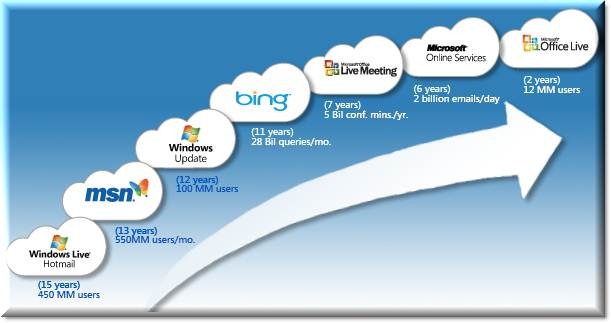China’s cloud technology industry is expected to grow to US$103 billion by 2020 as companies continue to digitize their business data and internal systems. The growing demand for cloud technology has led to both domestic and foreign IT companies rolling out new cloud services for Chinese consumers and businesses.
Data centres in China are not connected internationally as they are in nearly every other country. Local laws and regulations in China create both unique challenges and important considerations for businesses migrating and managing cloud technology in the country.
Dezan Shira & Associates has conducted an internal review of cloud providers in China and have partnered with Microsoft to offer a range of cloud-based solutions. In this article, we outline key considerations when using cloud technology in China.
What is the Cloud?
Cloud technology (also known as ‘cloud computing’) is when servers, storage, databases, networking, software, and analytics are hosted on the Internet and stored on large, privately owned data centers.
Instead of investing into physical hardware, businesses subscribe to these services and pay either a monthly or annual fee. This fee is determined by the amount of data and number of users a business requires – making it easier for a company to scale their operations up and down. Employees access business applications online while the company data is backed-up either online or in a physical data center.
Using Cloud technology not only allows businesses to save money on IT costs, it also keeps employees around the world better connected with their colleagues, clients, and partners: an important goal for foreign companies entering and expanding in Asia.

Cloud technology in China
In China, data centers that store and connect user data are ‘isolated’ from global networks. This means that, though cloud-users outside of China can still communicate and collaborate with their China-based colleagues, both must use separate user accounts and thus cannot access company data from a common source.
Similarly, companies headquartered outside of China can still manage China-based company systems and data by using a Chinese user account. However, these users will experience slower connection rates.
Despite these limitations, using the cloud remains a cost-effective way to scale operations and increase productivity in China. As Thomas Zhang, Dezan Shira & Associates’ IT Director, explains, “Cloud technology has remained a relatively closed industry in China. While this can create frustration for companies during the initial setup and familiarization phase, it does not hinder the overwhelming benefits of using the cloud.”
Microsoft Cloud in China
The Chinese government requires that data related to the privacy of its citizens, or else connected with the country’s physical and digital infrastructure, be stored in mainland China – a regulation that can be complied with when companies choose Microsoft’s China-based services. Microsoft has partnered with China-based 21Vianet to run two data centers in Beijing and Shanghai.
Only Microsoft’s China services can provide official VAT invoices (or a fapiao), a necessary requirement for some businesses that need to book their expenses in China for tax purposes.
Microsoft Office 365 and Azure have gained popularity for their ‘pay-as-you-go’ models, which allow companies to increase and decrease the volume and scale of Microsoft services they consume as their own operations expand or contract. In China, companies must pay in advance for these services annually, whereas global clients may modify their subscription packages monthly.
Microsoft is also the first cloud service provider to announce that their Chinese data centers follow the European Union’s General Data Protection Regulation (GDPR) – a regulation that most local players in China would fail to meet.
Finally, using data centers in China means faster connectivity between Chinese offices with a negligible impact on global offices.

Microsoft Cloud services in China
– Microsoft Azure
Microsoft’s Azure is a comprehensive set of Cloud services that allow developers and IT professionals to build, deploy, and manage applications. Azure is a platform as a service (PaaS), which means that businesses and individuals can ‘lease’ the digital space Azure creates to build and run websites and applications. Azure offers businesses the option of working completely on the cloud or in a hybrid format – using both cloud computing and on-premise servers.
As a PaaS platform, Azure can host scalable websites and apps, empowering individuals and teams to manage and collaborate on projects from around the world. Azure backs up all data across its many global data centers, ensuring information remains protected. Employees can access apps and sites hosted on Azure through nearly any mobile device while companies can regulate employee access to maintain privacy and security.
– Office 365
Office 365 is a Cloud productivity service, offering a suite of business process applications. These apps assist companies in meeting the changing demands of digitization by improving internal collaboration, mobility, intelligence, and security while offering scalable, enterprise level digital infrastructure.
In Office 365, businesses receive the familiar Office suite (Word, Excel, Powerpoint, Outlook), along with applications such as Skype for Business and Microsoft Teams. Additional productivity tools can like Power BI and Sharepoint can be installed to streamline businesses processes and provide insights on company health.
Key considerations
For many businesses, choosing a China-based cloud over its international counterpart is not merely convenient but may be mandatory to meet local regulations. In this regard, companies should exercise diligence in selecting a cloud service that will meet regulatory requirements without making compromises to internal privacy or connectivity.
– Data residency
Data residency (or data localization) refers to the physical location of data as well as the legal and regulatory requirements around it.
China’s Cybersecurity Law mandates that critical information infrastructure (CII) operators must store certain important data, including personal information relating to Chinese citizens, within mainland China. CII operators are network operators in sectors relating to China’s national security or public interest, such as information services, energy, and transportation. However, the precise definition CII operators remains vague.
When companies use their own on-premise servers to host data, this requirement is typically fulfilled automatically. When hosting data on a cloud platform, however, businesses are obliged to ensure this data remains within China. The easiest way to fulfill this requirement is to use a China-based cloud provider.
Cloud providers should outline the steps they take to conform to local regulations. However, professional services firms with regulatory and IT expertise can go the further step in ensuring all data storage remains compliant without compromising privacy or workflows.
– Privacy
Fulfilling local data residency requirements in no way means that companies have to compromise on privacy. Companies shopping for a cloud service provider should ensure look for robust privacy policies and guarantees that data is not shared with third parties.
When using Microsoft, customers retain the rights and titles to their data. Microsoft partners with China-based 21Vianet but uses only Microsoft technology and world-class cryptography. The data centers themselves also have 24-hour security and physical protection.
Furthermore, data stored in Microsoft centers is safeguarded by a ‘data trustee’: an independent body in charge of monitoring and auditing access to data. In order for Microsoft or 21Vianet to access this data, they first require permission from either the customer or the data trustee – any permission is subsequently recorded.

Migrating to the cloud
Ultimately, businesses opt for China-based clouds when enough of their workforce, clients, and partners are based in the country. A well-planned data migration from on-premise servers to cloud technology can save companies money and boost productivity as businesses grow their operations in China.



